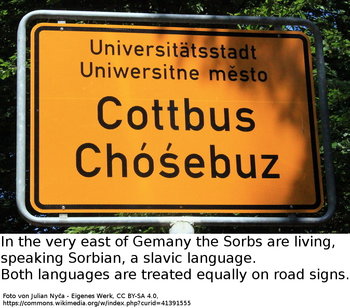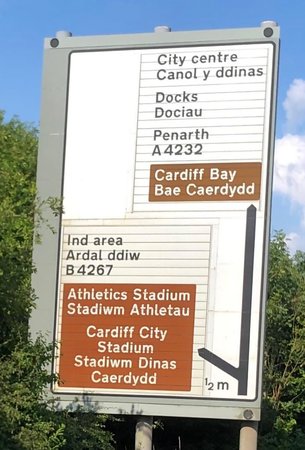| | | | And at continuation of this series about languages imposition and democracy Click here to subscribe or cancel your subscription |
In the autonomous regions of Spain there is language dispute and language imposition. You want to have some facts about languages? This series provides information and consists of 6 parts:
1. South Africa: Bloody insurrection against language imposition click, to read part 1
2. Catalonia: language imposition and the division of a nation click, to read part 2
3. Language imposition, falsification of history and indoctrination click, to read part 3
4. Language impositions in the Ukraine click, to read part 4
5. Ways out of language conflicts - What is Language?
6. Language protection - does this work in France? click, to read part 6
Language imposition and democracy
Part 5 Ways out of language conflicts - What is Language?
Language impositions can even take on existence-threatening forms as in some Baltic countries, where during the time of the USSR Russians immigrated (or were immigrated) and who today have to live as „sans papiers“ (stateless persons) without chances of income, accommodation etc. because they do not speak the corresponding Baltic language as required. [1]
The number of language conflicts in Europe alone, whether in Belgium, Hungary or close by in Turkey and North Africa, is always linked to a policy of nationalism. It is time to remember what nationalism actually means. In the 19th century, in the wake of the French Revolution against feudalism, the idea of the nation arose in Europe and an essential component in the formation of nations was and is, in addition to common cultural standards, sometimes also religion, a uniform language. In this context, it should be noted that the Kiev elites also act consistently in so far as they ensured that the Christian Orthodox Church was divided.[2] There is now a Ukrainian and a Russian Orthodox Church. But the Kiev government has only followed the example of Vladimir Putin, who in turn uses the Russian Orthodox Church as a propaganda department, as one German radio station[3] reported.
Nation is not identical with state. Some nations are or were split (e.g. Germanx), other states consist of more than one nation (e.g. Spain) and there are also national minorities in a state like South Tyrol in Italy.
Nations and modern states were together with capitalism giving enormous progress over feudalism. But to what extent is that still true? In the face of a constantly changing world, do we have to ask ourselves what is still useful and what is less useful? After all, nothing is eternal, including nations and states.
In a world of globalism, state government regulations can still offer certain protection through legal regulations, for example with the rights of working people, trade unions, land rights, laws for the environment, consumer protection, etc. But why do states or nations have to protect languages? Why do states or nations have to have only one language?
Why is it not possible to have several languages on an equal footing as official languages if there are corresponding majorities/minorities? In Sweden and Germany, minorities have a recognised status of their minority languages. This is also displayed on an equal footing.
Why should pupils not be taught in their mother tongue first, even if the mother tongue does not correspond to the main language spoken in a nation or state? It is undeniable that one learns best in one's mother tongue. Those who cannot learn in their mother tongue are discriminated against.
The argument that teaching pupils in two languages in one school is too costly cannot, at least, be applied in the prosperous EU, not even by those EU Member States that do not have so much public funding. If Greece spent 2.4% of its gross domestic product on armaments in 2017 and Germany „only“ 1.23% in 2018, it becomes clear that a political decision is needed on how taxes are to be distributed.
What is language?
Language, verbal or non-verbal, is initially nothing more than an instrument of communication. An instrument like a hammer, a car or a computer. Human communication is particularly characterized by verbal communication and thus becomes a very special instrument.
The peculiarity of human language is that it conveys feelings, much like music. Poets, authors, etc. use language like images, and words can actually evoke images within us.
In order to understand what language is, it helps to look at it soberly, because language and thinking are strongly connected with each other. If at first you are only pondering some considerations, meaning you have no concrete thoughts, only the dressing of thoughts in words allows us to understand. But the process also works the other way round. Words shape our thinking.
Thinking without the words „right“ and „left“
About 30% of all languages do not have a word for „right“ or „left“. The linguist Stephen Levinson, for example, reports about an encounter with an Australian Aborigine who says to him: „Watch out, there's a horde of ants running over your southern foot!“ [1]
„Over the past 10 years, 50 scientists under his leadership have investigated the relationship between spatial vocabulary and spatial orientation in 20 languages in 15 countries.“[2] This fact has already led brain researchers to investigate whether humans also have a rudimentary magnetic sense, similar to many animals. Apart from that, this example clearly shows how language places us in space. With „right“ and „left“ we understand the world as something around us, we ourselves are the centre of the world. With the 4 points of the compass we rather understand ourselves as something that is in this world.
To what extent this has to do with stronger or weaker egocentrism may be judged by others. This example makes very clear how thinking shapes our words, our language and how words and language affect our thinking.
Are languages born, live and die?
Some people like to put forward this thesis. Some derive the following demands from it:
* that you have to protect the languages,
* that languages are the wealth of a nation,
* that the different languages must have equal rights,
* that languages have the right to take their rightful place in their territory,
* that languages must not be lost,
* that languages must be defended.
Such a position overlooks, however, despite the peculiarities of language, language remains an instrument and instruments or tools are not born, live and die. That is why languages are like any hammer, any pliers:
* they do not need to (and cannot) be protected
* many languages do not necessarily make a national wealth
* they have no rights
* they do not own or occupy any territory
* Languages may and will be lost
* Languages don't have to (and cannot) be defended.
Let's take the example of the hammer. At first it was just a hand axe. With technical development it has always found specific, adapted shapes. Today there are rubber hammers, carpenter's hammers and pneumatic hammers. The diversity of the hammers is so great that many designations only exist in the respective technical language. This means that an instrument has always been adapted by people to practical needs. Surely there are also hammer forms which are no longer used today and for which the corresponding word has disappeared.
It's no different with languages. They are invented along human evolution, adapted and disappear again. This is also true when you consider that languages have a strong emotional cause and effect. Human feelings also change. Many people have patriotic feelings. 300 years ago there was no patriotism because there were no nations. If nations become extinct one day, patriotism will also become extinct and with it the words for it.
Modern Germans would find it difficult to understand the German that Goethe spoke, and the same applies to Englishmen with the English of Shakespeare.
Linguists have been wondering for some time whether the English language still belongs to the English at all. The British Empire, which once provided for the propagation of the English language, came to an end with the Second World War and was largely replaced by the USA, which itself speaks English. English speakers are largely tolerant in dealing with their language.
The situation seems different with the French, who, like the British, have lost their colonial empire. Mainly to the modern US empire, which could be clearly seen in Vietnam. Perhaps the French elites are more aware of this loss than the British and therefore try to preserve at least the French language as a reminder of a „Grande Nation“. Is it a sentimental attempt to stop the wheel of history and keep a language „alive“?
| | (Does language protection work in France?) | | And at continuation of this series about languages imposition and democracy Click here to subscribe or cancel your subscription |
Language impositions in the Ukraine
Ways out of language conflicts
[1] Die russischen Minderheiten in den baltischen Staaten (The Russian minorities in the Baltic States)
https://www.bundestag.de/resource/blob/502250/654ef0029bbdbd201739eff87ba11920/wd-2-010-17-pdf-data.pdf
und
Lettland und Litauen diskriminieren Russen massiv (Latvia and Lithuania massively discriminate against Russians)
https://www.infosperber.ch/FreiheitRecht/TV-Verbot-Lettland-und-Litauen-diskriminieren-Russen-massiv
[2] https://hpd.de/artikel/ukrainische-orthodoxe-kirche-spaltet-sich-russischer-ab-16793
[3] https://www.deutschlandfunk.de/russisch-orthodoxe-kirche-putins-propagandaabteilung.694.de.html?dram:article_id=316571
Thinking without the words „right“ and „left“
[1] https://www.zeit.de/2005/01/rinks_lechts
[2] ibid.
Myths and deceptions of Catalan nationalism

Here you'll find the translation
The strategy of recatalanization
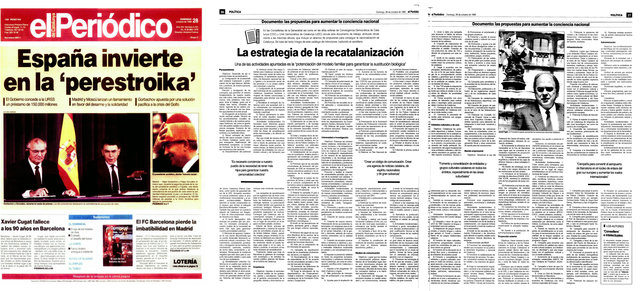 1980 the Spanish journal "El Periodico" published a secret document about the strategy of the Catalan government. It shows in a frightening way the actual spiritual world of the separatist leaders.
1980 the Spanish journal "El Periodico" published a secret document about the strategy of the Catalan government. It shows in a frightening way the actual spiritual world of the separatist leaders.Now it is available in english translation.
Pancatalanism
the separatist's imperial claim
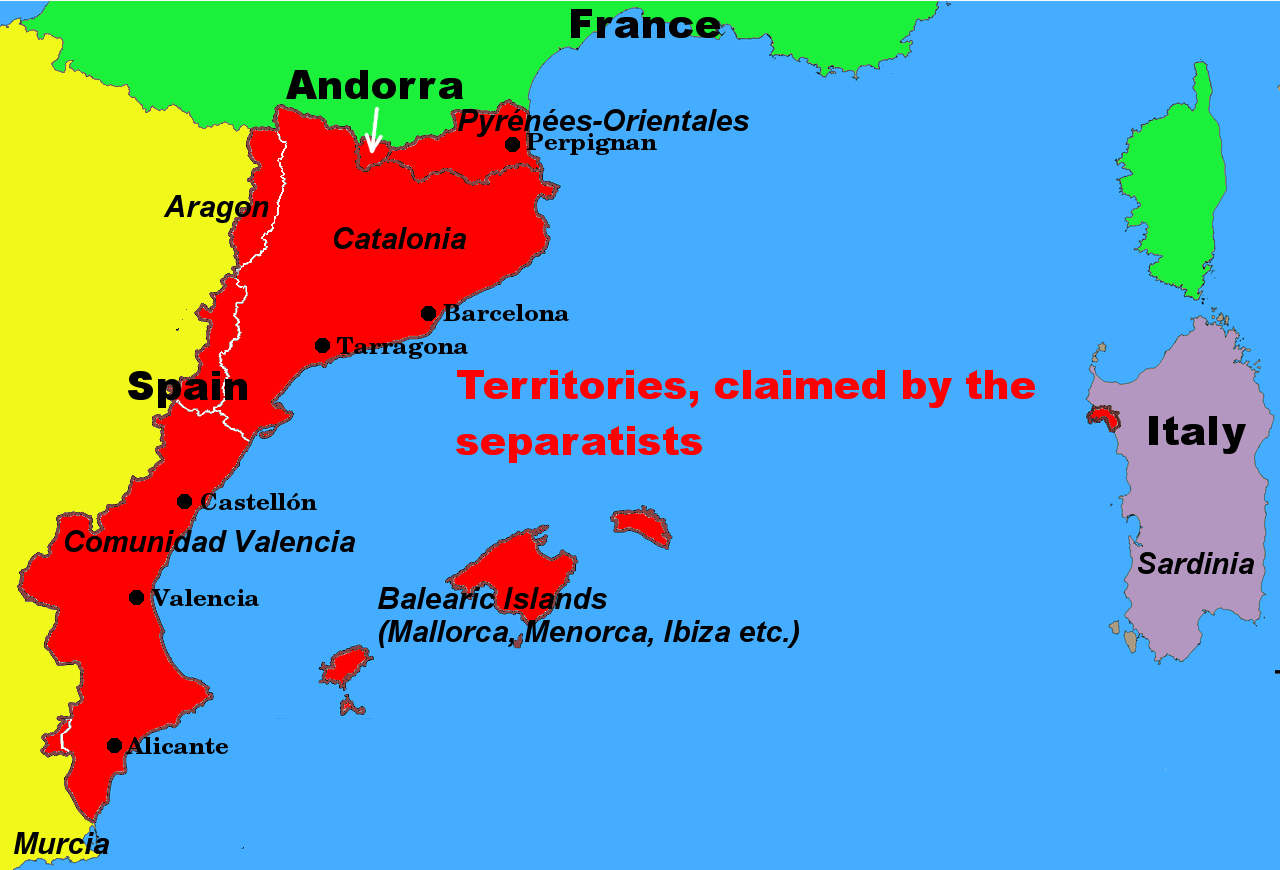 The Catalan government exports the conflict into communities with Catalan population, supporting all efforts of the separatists including financial means to destroy Spain.
The Catalan government exports the conflict into communities with Catalan population, supporting all efforts of the separatists including financial means to destroy Spain. An important tool is the establishment of a language dictatorship that is not afraid to use the same means as Franco.
Separatist indoctrination

Click here to read the study
Publications
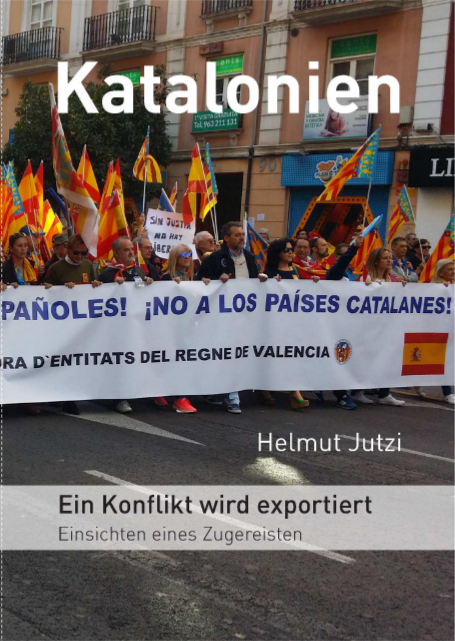 The title says: "Catalonia, a conflict is exported. Insights of a migrant"
The title says: "Catalonia, a conflict is exported. Insights of a migrant"Sorry, up to now, this book is only available in German. However, drop us a line, if you are interested to learn more Contact.
